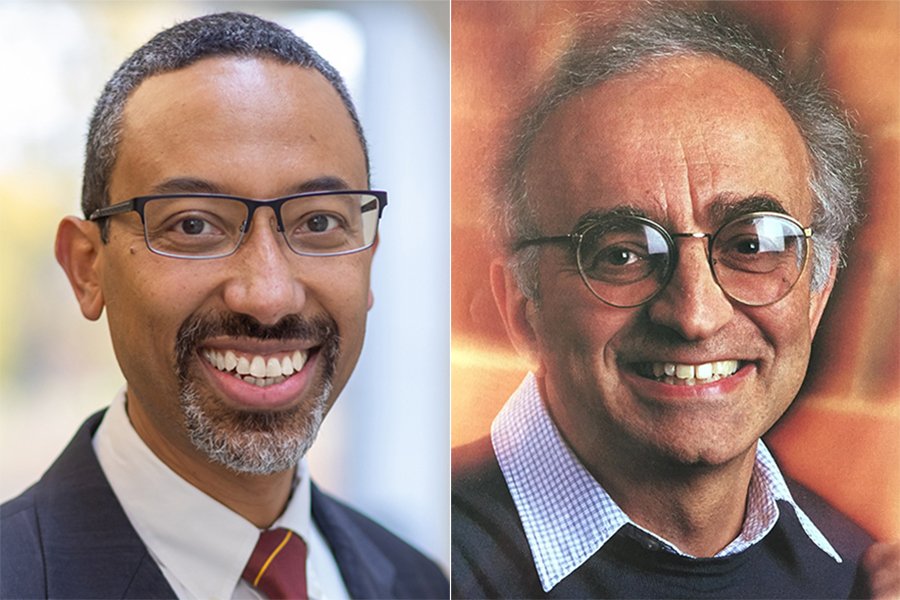Two CSE faculty elected to National Academies in 2023

Induction is one of the highest honors for scientists and engineers
MINNEAPOLIS / ST. PAUL (05/26/2023)—Two University of Minnesota College of Science and Engineering faculty will be inducted into National Academies in 2023. Induction into the National Academy is one of the highest honors for scientists and engineers.
Andrew G. Alleyne - National Academy of Engineering
Andrew G. Alleyne, a mechanical engineering professor and dean of the University’s College of Science and Engineering, has been elected to the National Academy of Engineering. An accomplished researcher, educator, and academic leader, Alleyne has been dean of the University’s College of Science and Engineering and a faculty member in the Department of Mechanical Engineering since January 2022.
As dean, Alleyne is the college’s chief executive officer and chief academic officer. He provides collaborative leadership to maintain and enhance the college's excellence as a global leader in research and education encompassing the physical sciences, engineering, mathematics, and computer science.
He is a nationally renowned expert on modeling and control of dynamic thermal systems, with applications in aerospace, automotive systems, and buildings. He is responsible for developing tools and methodologies used by government and industry to create more effective and efficient energy systems, particularly those that change as a function of time.
Prior to coming to the University of Minnesota, Alleyne was a faculty member in mechanical science and engineering at the University of Illinois at Urbana-Champaign from 1994 through 2021 and served in multiple academic leadership roles at all levels of the institution. He led the National Science Foundation Engineering Research Center on Power Optimization of Electro Thermal Systems (POETS), an ambitious multidisciplinary center based at the University of Illinois in partnership with three other U.S. universities, two international institutions, and many industry and government partners.
In addition to his on-campus work, Alleyne was involved in the support of multiple government agencies including the Department of Defense and the Department of Energy. In these roles, he supported the development of technology to maintain and improve national capabilities for the support of the U.S. He was the recipient of the Chief of Staff of the Air Force Exceptional Public Service Award which is the most prestigious award granted by the U.S. Air Force to non-employee civilians.
Alleyne is a Fellow of the Institute of Electrical and Electronics Engineers (IEEE), American Society of Mechanical Engineers (ASME), and American Association for the Advancement of Science (AAAS).
The National Academy of Engineering elected only 106 new members nationwide and 18 international members this year.
Boris I. Shklovskii - National Academy of Sciences
Boris I. Shklovskii, a professor in the School of Physics and Astronomy has been elected as a member of the National Academy of Sciences. Shklovski is a world-renowned expert in theoretical physics. He currently holds the A.S. Fine Chair of Theoretical Physics.
Shklovskii earned his master’s degree in physics from the University of Leningrad in 1965 and his Ph.D. in physics from the Ioffe Institute in 1968 working on the theory of sound absorption in insulators. From 1966 until 1989, he worked in the Ioffe Institute on electronic properties of doped semiconductors. In 1986, he was awarded by the Landau Prize of the Academy of Sciences of USSR for best achievements in theoretical physics.
He joined the faculty of the University of Minnesota and the William Fine Theoretical Physics Institute as Fine Professor of Physics in 1989. He worked on the theory of Quantum Hall Effect and applied ideas of low temperature physics to biologically motivated problems of interaction of large charges in water. His theory explained the counterintuitive phenomenon of charge inversion widely used for DNA in gene therapy. His recent research focuses on electron transport in semiconductor nanocrystal arrays, topological insulators, and oxide heterojunctions.
Shklovskii, a fellow of the American Physical Society, received the prestigious 2019 Oliver E. Buckley Condensed Matter Prize. Shklovskii is the author of more than 260 scientific papers, has presented numerous talks in his field of research, and has mentored more than a dozen graduate students.
The National Academy of Sciences is a private, nonprofit institution that was established under a congressional charter signed by President Abraham Lincoln in 1863. It recognizes achievement in science by election to membership, and—with the National Academy of Engineering and the National Academy of Medicine—provides science, engineering, and health policy advice to the federal government and other organizations.
See a full list of the College of Science and Engineering's National Academy members.
